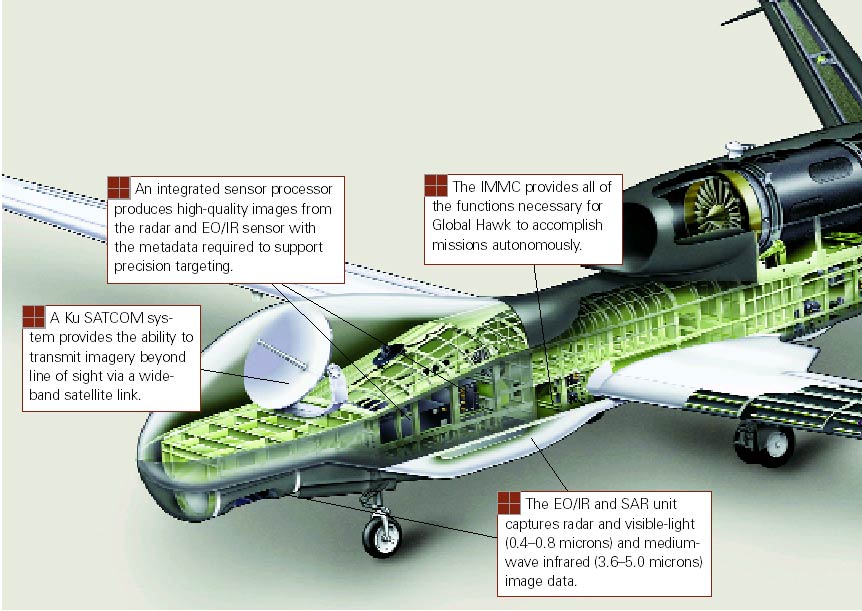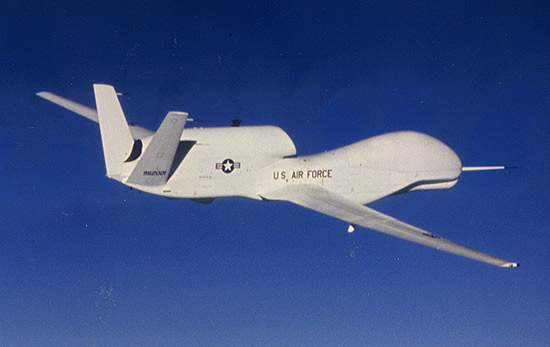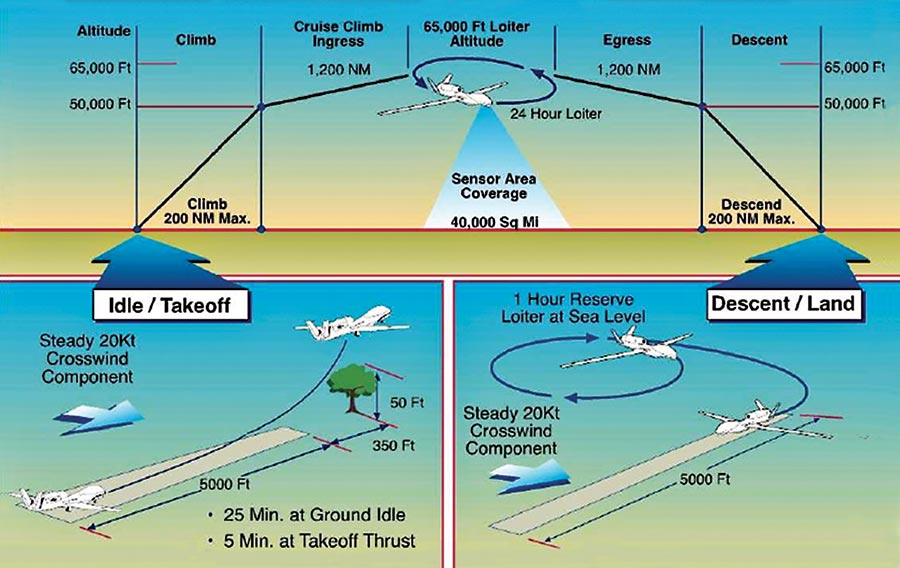KUALA LUMPUR: I refer to the story below by DefenseNews. Its sounds interesting, although it is still in the concept stage (the joint usage) do you think we should go for it especially for the Eyes In the Sky programme? Or is it too American for us? Certainly a much cheaper option from buying a whole fleet of UAVs
For Malaysian Defence it is a good concept and it will be much better if it is operated by Asean together with the US of course (other US allies like Japan, South Korea and Australia could have their own) which could bring the region military together finally.
The story refers to other countries as well such as Sri Lanka and others, but I believed it will be much better and much easier to put up if its only an Asean Global Hawk fleet.
What say you?
— Malaysian Defence
Pacific Rim Countries Could Get Global Hawk
By GAYLE S. PUTRICH
LAS VEGAS — The U.S. Air Force plans to host 11 friends and allies in Hawaii next spring to pitch the idea of working together to put more eyes in the skies over the Pacific.
At an unmanned systems conference in Las Vegas, Gen. Jeffery Remington, director of air, space and information operations for Pacific Command, outlined a plan to bring together representatives from Australia, Brunei, India, Indonesia, Japan, Malaysia, the Philippines, Singapore, Thailand, South Korea and Sri Lanka in April to discuss a regional consortium to buy and operate Global Hawk UAVs, which are built by Northrop Grumman.
At $27.6 million apiece, only a few of the countries can afford to buy a Global Hawk — perhaps Japan, Singapore and South Korea — so the consortium will allow more nations partial access to the long-range UAV, Remington said. Partners would agree to provide launch and landing sites for the Global Hawk and to share the information it gathers.
“The cost of admission is access,” he said. “The price of admission is cooperation.”
As new technology, sensors and UAVs become available, such as the Navy’s Broad Area Marine Surveillance (BAMS) sensor, they could be added to the consortium, he said.
The plan for the April summit is to kick off discussion at Hickam Air Force Base and then travel to Beal Air Force Base, Calif., home of the 9th Reconnaissance Wing, for a demonstration of the Global Hawk as it takes off, flies a mission and returns. The group would then head back to Hickam to wrap up details.
Of particular interest to all the countries would be monitoring the Straits of Malacca, the 500-mile stretch of sea between Indonesia and Malaysia that connects the Indian Ocean and the Pacific. Between one-fifth and one-quarter of the world’s shipping passes through the Malaccan strait, which has become an increasingly attractive target for modern-day pirates.
The Global Hawk is designed to gather radar, optical and infrared data from as high as 65,000 feet for as long at 35 hours.
The U.S. Air Force expects to start flying missions from Andersen Air Force Base on Guam in 2009.
Northrop Grumman officials said the arrangements are entirely in the hands of the Air Force and would go through government-to-government channels, but that the company enjoys the idea of global sales.
“Whatever they decide as far as Global Hawk, the requirements or the demonstration, we’re definitely ready to support them,” Northrop spokeswoman Renee Freeland said.
Remington said Global Hawk was the logical choice for an international UAV partnership because it is an unarmed air-breathing system that is easy to operate, “benign and not super-secret.”
But the focus on the consortium should be more on cooperation, he said, and not so much on the particular UAV.
“This is not about Northrop Grumman. This is not about selling Global Hawk to anyone,” he said. “This is about bringing countries and technology together and leveraging it. This is about saying, ‘We’re not going to spy on each other; we have to develop some kind of trust.’”
U.S. Pacific Command is working with the State Department, U.S. ambassadors to prospective partner nations and the Office of the Secretary of Defense, where opinions on the idea are split. Remington said the big question is: Will providing certain nations access to the Global Hawk stabilize or destabilize the region?
“You have to have that debate, and that is a debate that is going to go on inside the Beltway,” he said. “I don’t have the answers to those questions.”
There are also Missile Technology Control Regime (MTCR) rules to sort through. Because of its propulsion, the Global Hawk is treated like a cruise missile and not an airplane under the regulations.
The unmanned aircraft is also charting new territory through domestic air traffic control.
“The U.S. Air Force already has to contend with FAA [Federal Aviation Administration] restrictions at home, and putting more than 10 other countries into the mix will be difficult,” Remington said.
Standardizations and frequency allocations would have to be sorted out and would likely be difficult, particularly with Japan’s already crowded spectrum.
But some of the interested countries are already well ahead of the United States in handling unmanned systems. Singapore already has a UAV command, something the Pentagon has not yet put together.
Even with so much up in the air, Remington said, there is still plenty of room to get discussions going with potential partners.
“It’s in our interest to sell our technology to our friends,” he said. “We have to ensure that our friends in the Pacific can stand with us.”






China would definately be suspicious of regional cooperation with US that excludes them. I would prefer an exclusive club of ASEAN countries working together in ensuring safety of the region. Inviting America policing our region is an invitation for disaster. Perhaps America should use the Global Hawk in policing South America in combatting the drug trade.
With the growing affluence of ASEAN states, increase defence spending mean better equipment and better training. And, I mean what kind/type of threat in the region that we need to draw in a superpower to police our trade routes ? Pirates ? And our combined forces aren’t able to take them on ?
America need to understand that their increase military spending, flexing of muscle would not make the world a safer place. It just invites “others” (whatever that means) in picking a fight with them and inevitably the rest of the countries in the Consortium.
If the history of the Malay States in the 19th century is anything to go by, one does not lose freedom/independence overnight. Such loss is incremental and surreptitious. Today it is just a few unmanned aerial vehicle policing from 60,000 feet. In a few years to come, we would have to allow the stationing of US forces. And that is when the problem really start.
My 2 cents worth of thought … stay out of it IF …and that is a BIG IF …we can agree with Singapore, Thailand and Indonesia not to participate. If those 3 countries are in..what else can we do except to participate.
The Big C would of course would try to intervene if the Global Hawk programme as proposed by the US. But an Asean/US Global Hawk initiative would possibly get a grudging approval from China.
I dont tjhink the US would approve the an Asean Global Hawk fleet without its participation. Anyhow even without our participation a Global Hawk flying on the fringe of the Indonesian airspace would be able to scan the Malacca Straits pretty well.
US, Russian and China military satellites are already trawling over our skies. We dont have access to this satellites apart from GPS signals which could be degraded when they want it.
An Asean Global Hawk fleet would give us some of the intel.
US forces are already in stationed in the archipelago, Singapore of course. Anyhow traditionally, it has always been Malaysia that has not agreed to such joint-operation with the US
Thailand and the US had wanted to expand its Cobra Gold exercise to include other Asean countries namely Malaysia, Brunei, Singapore and Philippines. But we had always oppose it. Singapore had joined Cobra Gold since 2000 as does the Philippines.
Malaysia had sent observers to Cobra Gold since Pak Lah took over, however, although full-blown participant remained years away. With Iraq it would be impossible, but thanks to the Thai coup, we have some breathing space.
I believe Singapore, Thailand, Philippines, Indonesia and Brunei would agree to the Pacific Global Hawk programme. If its expanded to an Asean Global Hawk programme, they would jump to it.
Malaysia, I believe would not agree to the Pacific fleet, which will still be able to run if the Philippines and Indonesia approved it. They simply routed it through the philippines, indonesia and thailand and vice versa.
An Asean Global Hawk will not include Malaysia, I believe.
Since you brought up the topic of US-ASEAN countries military training, I am curious, why is it that we don ‘t participate in Cobra Gold and merely have an observer status ?
We have a yearly CARAT exercise with US, so why is it that we choose to have a bilateral exercise with US under CARAT but not have an exercise with US, Thai and Spore under Cobra Gold ?
In one sentence? Dr Mahathir of course.